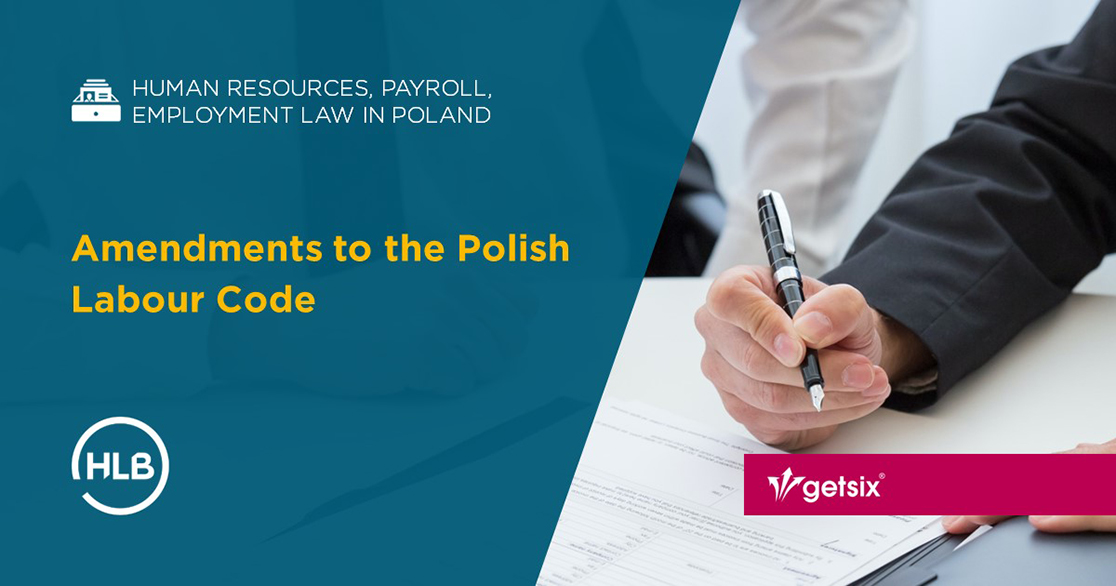Amendments to the Polish Labour Code
24 April 2023
24 April 2023

As of 26 April, 2023, the provisions of the Act of 9 March 2023 amending the Labour Code Act and certain other acts come into force, implementing two important EU directives:
Below we outline the most important changes introduced by this Act:
Until now, only the termination of an open-ended employment contract or termination without notice required the employer to state reasons. After the changes, the obligation to give a reason for termination will also exist for fixed-term contracts.
Transitional provisions stipulate that termination of a fixed-term employment contract without justification is possible till the day before the amendments to the Labour Code enter into force, i.e., 25 April 2023.
Until now, information on the terms and conditions of employment had to be provided within 7 days from conclusion of the employment contract, whereas after the amendments it will be 7 days after the employee has been admitted to work.
The information on the terms and conditions of employment from now on have to include information on:
In addition, an obligation has been introduced to inform about name of the social security institution no later than 30 days from the date of the employee’s admission to work. This does not apply in the case where the employee chooses his social security institution by himself.
In most cases, the Social Insurance Institution (ZUS) will be indicated here. It is advisable to include this information already in the information on the terms and conditions of employment.
An important improvement is that the information on the terms and conditions of employment and the name of the social security institution can be provided to the employee electronically, provided, however, that it is accessible to the employee with the possibility of printing and storing it. The employer should keep evidence of their transmission or receipt by the employee.
The amendment to Article 134 of the Labour Code introduces additional breaks at work. Thus, if the daily working time of an employee:
These breaks are reckoned as working time.
Following the changes, the length of parental leave will be 41 or 43 weeks, respectively, in the case of giving birth to one child or in the case of giving multiple birth. At the same time, the legislator introduces an exclusive right to 9 weeks of parental leave for each parent.
In practice, this means that neither parent can waive the right to these 9 weeks in favour of the other – the child’s mother continues to be entitled to 32 weeks of parental leave, while the father acquires 9 weeks of leave.
Employees who were entitled to parental leave from 2 August 2022 until the date of entry into force of this Act can take parental leave in the new size.
Until now, maternity benefit was paid at 100 per cent of the basis for assessment for the first six weeks of parental leave and 60 per cent of the basis for assessment for the remainder of that leave (on average 67.5 per cent of the benefit base). With the amendment to the Labour Code, the amount of benefit for the entire period of parental leave will increase to 70%. If the employee submits a relevant application no later than 21 days after having given birth, the monthly maternity benefit for the period of maternity and parental leave will therefore amount to 81.5 per cent of the basis for assessment of the benefit.
As from 26.04.2023 onwards, an employee will be entitled to force majeure leave for urgent family matters caused by illness or accident of 2 days or 16 hours upon request made by the employee in the application at the latest on the day the leave is taken. During the period of this leave, the employee retains the right to half salary payment.
An additional entitlement is granted to employees who provide personal care or support to a person who is a member of the family or who resides in the same household. This leave is granted at the size of 5 days per calendar year.
It is unpaid leave, but its period counts as part of the period of employment on which the employee’s entitlements depend.
The provisions of Directive 2019/1158 define the concept of flexible working arrangements as the possibility for an employee to adapt his or her working arrangements, including through the use of remote working, flexible work schedules, or reduced working hours, to reconcile work and family life.
An employee raising a child, up to the age of 8 years, may submit a request in paper or in electronic form for the application of flexible work arrangements. The application shall be submitted not less than 21 days before the planned start of the use of flexible working arrangements.
Forms of flexible working time organisation include:
The changes introduced aim to increase the protection of workers and shall encourage employers to provide more stable and safer working conditions.
If you have any further questions or require additional information, please contact your business relationship person or use the enquiry form on the HLB Poland website.
***
Download the brochures providing general information and outlining the services that are offered by HLB member firms.
Learn moreClick below for more detailed information regarding population, major towns and cities, language, religion and holidays in Poland.
Learn more